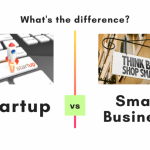In our previous article, we discussed the differences and similarities between MSMEs and startups. As a continuation, this article will delve deeper into practical examples of businesses in Africa that fall under these two categories. Knowing what qualifies as an MSME or a startup can help entrepreneurs and stakeholders recognize their business potential and where they fit within Africa’s thriving economy.
As an African entrepreneur, you may often come across opportunities—funding, competitions, or mentorship programs—that are specifically targeted at startups. But how do you know if your business qualifies as a startup, or if it falls under the category of an MSME (Micro, Small, and Medium Enterprise)? Understanding the key differences and knowing where your business fits can help you make informed decisions about which opportunities to pursue. This article will clarify what qualifies as a startup and an MSME and provide examples of each within the African context
Examples of MSMEs in Africa
MSMEs cover many industries in Africa, from small family-owned shops to medium-sized manufacturing companies. Here are examples of MSMEs across the continent:
1. Retail Shops and Local Traders
Example: Mama Ogechi’s Store (Nigeria) – A local retail shop selling groceries and household items. This type of micro-enterprise serves the immediate community, offering essential products to local consumers.
Type: Micro-Enterprise
Characteristic: Small, community-focused, with limited employees, typically funded by personal savings or local microloans.
2. Small-Scale Agriculture Businesses
Example: Kokowagbo Farms (Ghana) – A small-scale agricultural farm producing and selling organic vegetables to local markets. Agriculture-related MSMEs dominate rural African economies, often employing local labor and contributing significantly to food security.
Type: Small Enterprise
Characteristic: Traditional business models, stable growth, and long-term sustainability.
3. Manufacturing and Processing
Example: E-Factory (Kenya) – A medium-sized enterprise that manufactures eco-friendly packaging materials for local companies. Manufacturing MSMEs provide essential goods for local markets, supporting larger industries like retail, hospitality, and more.
Type: Medium Enterprise
Characteristic: Focus on domestic or regional production, employs up to 250 people, and seeks steady growth.
4. Crafts and Artisan Businesses
Example: Zulu Crafts (South Africa) – A business specializing in handmade traditional crafts, jewelry, and clothing, often sold to tourists or exported internationally. Many artisans run MSMEs that preserve African heritage while supporting their livelihoods.
Type: Small Enterprise
Characteristic: Craft-based, low-tech production, often relying on the local market and sometimes exporting products.
Examples of Startups in Africa
Startups in Africa are typically tech-driven, innovative, and focused on solving specific problems, often with the potential for rapid growth. Here are examples of prominent startups across Africa:
1. Fintech Startups
– Example: Flutterwave (Nigeria) – A leading fintech startup that provides payment infrastructure for global merchants and payment service providers across Africa. Flutterwave has rapidly scaled across multiple countries, attracting significant venture capital funding.
Type: Startup
Characteristic: Technology-driven, focused on scalability, high growth potential, and often backed by venture capital.
2. Health Tech Startups
Example: 54gene (Nigeria) – A genomics startup aimed at addressing the underrepresentation of African genetic material in research. It has revolutionized health research in Africa and secured funding from international investors.
Type: Startup
Characteristic: Focused on innovation in healthcare, with a global expansion strategy and high social impact.
3. Agritech Startups
Example: Twiga Foods (Kenya) – A platform that connects small-scale farmers to vendors through a mobile-based supply chain, improving food distribution and reducing waste. Twiga Foods addresses inefficiencies in Africa’s agricultural sector and is rapidly expanding across the region.
Type: Startup
Characteristic: Tech-enabled, scalable, and addressing critical supply chain issues, attracting international attention.
4. E-commerce Startups
Example: Jumia (Africa-wide) – An e-commerce platform often referred to as the “Amazon of Africa.” Jumia provides a wide range of services, from online retail to food delivery, and has become a leading name in Africa’s digital economy.
Type: Startup
Characteristic: Online platform, scalable across multiple markets, heavily reliant on technology for rapid growth.
Both MSMEs and startups play pivotal roles in Africa’s economic transformation:
MSMEs: These businesses stabilize local economies by creating jobs, supporting communities, and contributing to GDP. They often operate in established industries like retail, agriculture, and manufacturing.
Startups: Startups are leading innovation, using technology to disrupt traditional sectors like finance, healthcare, and logistics. They drive international attention and funding to Africa’s rapidly developing economies.
How MSMEs and Startups Benefit from Ecosystem Support
Both MSMEs and startups thrive in supportive ecosystems that offer access to finance, mentorship, and markets. For MSMEs, programs like the African Development Bank’s MSME initiatives provide vital resources, while startups benefit from accelerator programs and venture capital networks across Africa.
Whether you’re running an MSME or scaling a startup, knowing where your business fits in the African ecosystem can help you leverage opportunities for growth and sustainability. MSMEs provide the foundation for local economies, while startups push the boundaries of innovation and scalability. Both types of businesses are integral to Africa’s economic development.










